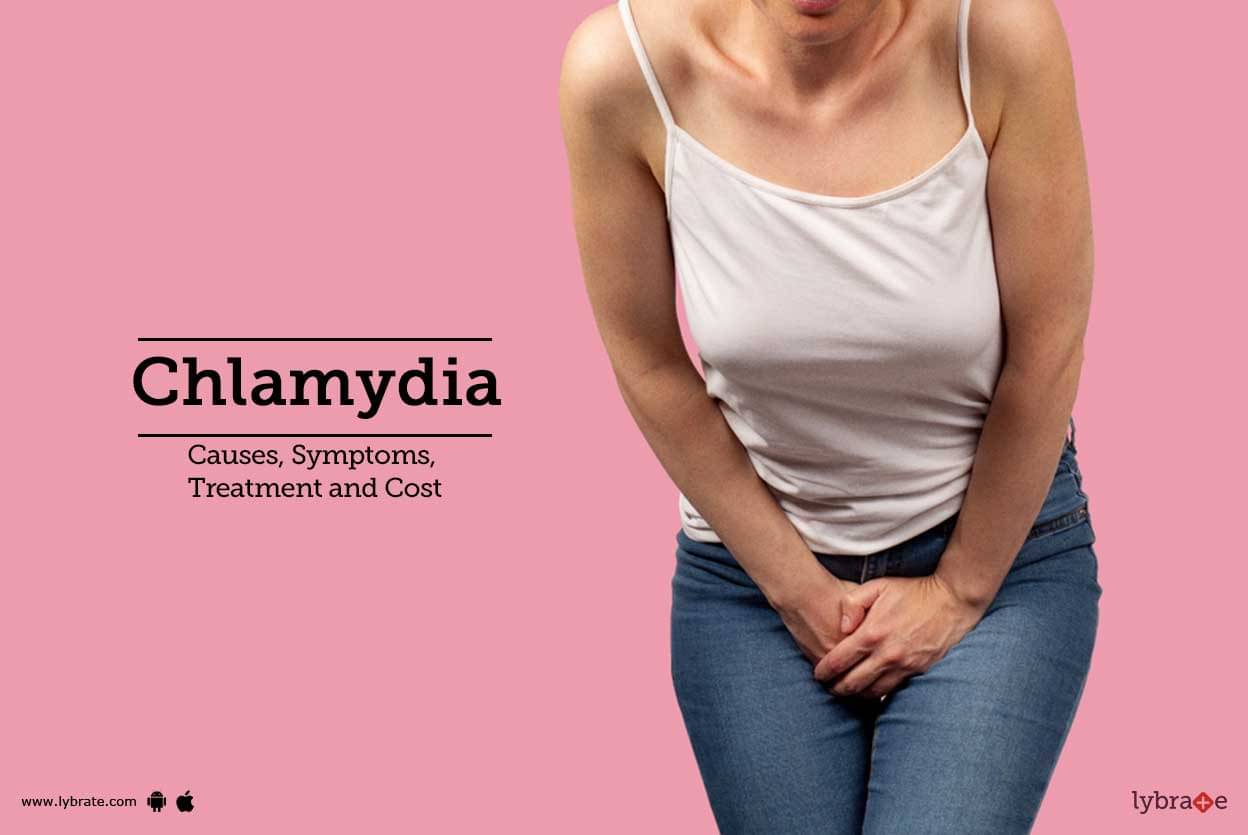Chlamydia: Causes, Symptoms, Treatment and Cost
Last Updated: Jul 04, 2023
What is Chlamydia?
Chlamydia is a fairly prevalent sexually transmitted infection (STI) due to the bacterium Chlamydia trachomatis. It can be passed from mother to baby during childbirth through unprotected sexual activity, including oral, vaginal, and anal intercourse. If not treated swiftly and effectively, this infection might have major medical effects.
Types of Chlamydia
There are three types of chlamydia: genital, ocular, and laryngeal.
- Genital Chlamydia: It is the most common type of infection, with symptoms such as genital inflammation, discharge from the genitals or rectum, pain during urination or sex, itching or burning in the genital area. It can be spread through any type of sexual contact involving an infected person’s genitals.
- Ocular Chlamydia: It is an infection of the eyes that can cause severe eye pain, redness, light sensitivity, blurred vision and even blindness if left untreated. It can be spread through direct contact with an infected person’s eyes or through contact with contaminated surfaces such as towels or bedding.
- Laryngeal Chlamydia: It is an infection of the throat and larynx that causes sore throat and difficulty swallowing. It can be spread through kissing someone who has an active infection in their throat or mouth as well as sharing food or drinks with someone who has it.
What causes Chlamydia?
- Chlamydia is often transmitted through sexual contact with an infected person. Even if no one cums, it is possible.
- Chlamydia is most commonly transmitted through vaginal and anal intercourse, although it can also be transmitted through oral sex.
- If you have contaminated secretions on your hand, you can develop chlamydia by touching your eye.
What are the symptoms of Chlamydia?
The most common symptoms of chlamydia include:
- Burning sensation when urinating.
- Unusual discharge from the penis or vagina.
- Pain in the lower abdomen.
- Pain during intercourse.
- Bleeding between menstrual periods in women.
How can you prevent Chlamydia?
It is suggested that individuals engage in safer sexual practises, such as the use of a condom or dental dam during any sort of sexual activity, in order to reduce their risk of contracting chlamydia.Additionally, it is essential to restrict the number of sexual partners one has and to undergo frequent testing for sexually transmitted infections (STIs).
Chlamydia - Diagnosis and Tests
Diagnosis of chlamydia usually involves a physical examination, swab test or urine sample.
- Swab tests: They involve taking a sample from inside the vagina, urethra (urine tube), or rectum with a cotton swab.
- Urine analysis: Taking a sample of a person's urine involves urinating into a cup and then delivering the urine to a lab for analysis.
- NAATs: They are considered the most accurate way to test for chlamydia in urine samples, as they can detect genetic material from the bacterium itself. EIAs and DNA probe assays are slightly less sensitive but still effective at detecting chlamydia in a urine sample.If a positive result is obtained from any of these tests, it means that an individual has been infected with Chlamydia trachomatis, and they should seek treatment as soon as possible.
What are possible complications of Chlamydia?
- If left untreated, chlamydia can lead to serious complications in both men and women, including infertility and an increased risk of other STIs.
- In women, complications can include pelvic inflammatory disease (PID), which may lead to long-term pelvic pain and ectopic pregnancy.
- Chlamydia can cause epididymitis, a painful disease of the testicles that can lead to infertility in males.
Home Remedies for Chlamydia?
- Consume a diet rich in probiotic foods, such as yoghurt, kefir, sauerkraut and kimchi.
- Take garlic supplements or eat raw garlic cloves daily to boost your immune system.
- Drink plenty of water throughout the day to flush out toxins and keep the urinary tract healthy.
- Consume herbs high in antioxidants such as turmeric, ginger, cinnamon, oregano and rosemary to help fight off infections like Chlamydia.
- Include foods that are high in Vitamin C like oranges, lemons and grapefruits to help boost immunity and fight off infection-causing bacteria like Chlamydia.
- Use herbal tea blends with antibacterial properties like chamomile tea or green tea to help flush out toxins from the body and improve overall health and immunity against Chlamydia infections.
- Use raw honey as a natural antibiotic for fighting off infections caused by bacterial strains such as Chlamydia trachomatis bacteria which causes chlamydial infections of the eye (trachoma) or genital tract (genital chlamydial infection).
What to eat in Chlamydia?
There is no one particular meal that has been linked to Chlamydia. On the other hand, it is essential to have a nutritious diet that consists:
- Lots of fruits and vegetables.
- Lean proteins.
- Whole grains.
- Dairy products with a lower fat content.
What not to eat in Chlamydia?
It is generally recommended to avoid any undercooked or raw foods, as well as unpasteurized dairy products, when dealing with Chlamydia.
Additionally, it is advisable to not eat any seafood that has not been cooked thoroughly, and to avoid any uncooked or contaminated fruits and vegetables.
Chlamydia Treatments
Following are some treatments for Chlamydia:
- Medications: The infection can be treated with antibiotics like, azithromycin and doxycycline, either in a single dose or taken over a period of 7 days. It is essential to finish the course of medicine that has been recommended in order to successfully treat chlamydia and avoid any future difficulties.
- Lifestyle Changes: Making lifestyle changes such as limiting your number of sexual partners and using condoms every time you have sex can help reduce your risk of contracting chlamydia or passing it on to someone else.
- Herbal Remedies: Certain herbs like garlic, tea tree oil, goldenseal root, oregano oil, and echinacea may help treat some symptoms related to chlamydia but should not be used as a primary method of treatment without consulting your doctor first.
- Natural Supplements: Taking natural supplements such as Vitamin C or zinc may help boost your immune system and increase the effectiveness of antibiotics you may be taking to treat Chlamydia.
Which doctor to consult for Chlamydia?
A doctor specializing in sexual health or a general physician can both diagnose and treat Chlamydia.
Which are the best medicines for Chlamydia?
- The best medicines for Chlamydia are azithromycin and doxycycline, which are both antibiotics used to treat bacterial infections.
- Antibiotics: Chlamydia is often treated with antibiotics, either orally in the form of tablets or intravenously in the form of injections.
- Based on the symptoms you're experiencing and the other considerations, your doctor will select the medication kind and dose that will work best for you. In order to guarantee that the infection is entirely cleared up, it is essential that you take all of your antibiotics in the manner in which they were given to you.
How long does it take to recover from Chlamydia?
The typical recovery time for Chlamydia is usually within 7 to 21 days of starting treatment.
However, it is critical to complete the full course of antibiotics and any suggested follow-up tests to confirm that the infection has been completely eliminated. It might take up to three months for signs to go away entirely.
Are the results of the treatment permanent?
The results of Chlamydia treatment are usually permanent if the full course of antibiotics is taken as prescribed. However, if the infection is not completely eliminated, it may recur. People who have had Chlamydia therapy should be tested again three months later to check that the infection has been eradicated.
What are the treatment guidelines?
Post-surgical treatment guidelines for Chlamydia vary depending on the severity of the infection and the type of surgery performed.
Antibiotics should be administered to patients for at least one week after surgery. Antibiotics may be taken orally or intravenously, depending on the severity of infection. Additionally, it is important to follow up with a doctor for any signs or symptoms of complications following surgery.
It is also important to practice safe sex and use protection if engaging in sexual activity after treatment with antibiotics. This helps prevent reinfection and spread of Chlamydia to sexual partners.
What is the cost of Chlamydia treatments in India?
The cost of Chlamydia treatments in India varies depending on the type of treatment and the severity of the infection. Generally, a doctor consultation fee and laboratory test fees are required for diagnosis.
The treatment costs can range from a few hundred rupees for antibiotics to thousands for more complicated treatments such as surgery or IV medications. Additional follow-up visits may be necessary in some circumstances to monitor progress or discover any issues.
Chlamydia - Outlook / Prognosis
If you are suffering from any complications relating to Chlamydia then you should consult a doctor nearby as they can have complications like pelvic inflammatory disease (PID), epididymitis etc., in which treatment courses can range from a few months to years depending on the severity of the situation.
References
- Chlamydia Infections- Medline Plus, NIH, U.S. National Library of Medicine [Internet]. medlineplus.gov 2019 [Cited 23 July 2019]. Available from:
- Chlamydia- Office on Women's Health, U.S. Department of Health & Human Services [Internet]. womenshealth.gov 2017 [Cited 23 July 2019]. Available from:
- Chlamydia - CDC Fact Sheet- CDC, Centers for Disease Control and Prevention [Internet]. cdc.gov 2018 [Cited 23 July 2019]. Available from:
Table of content
15+ Years of Surgical Experience
All Insurances Accepted
EMI Facility Available at 0% Rate
Find General Physician near me
Ask a free question
Get FREE multiple opinions from Doctors


